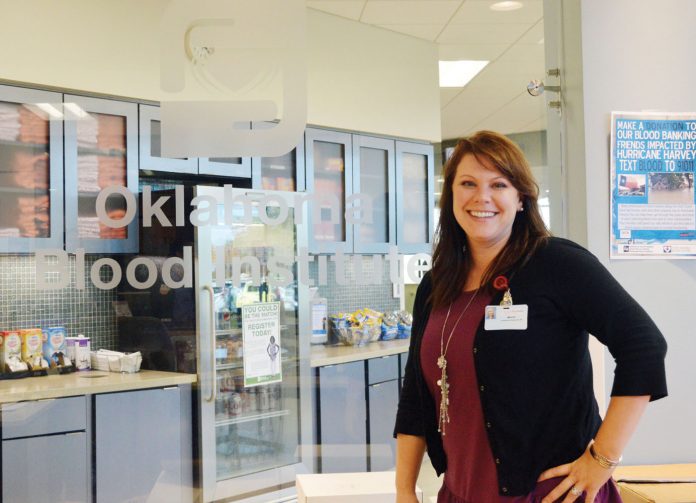
story and photo by Traci Chapman, Staff Writer
For Mandi Kaiser, it all started with a newspaper advertisement, an ad that would change the entire direction of her life.
“I was working as a waitress, I turned 21 and knew I wanted to do something different,” Kaiser said. “This ad, it said, ‘phlebotomist wanted, will train’ and I just had a feeling that this was it, what I needed – I just knew I wanted to do something in the medical field.”
Kaiser got her wish, landing the job, as an Oklahoma Blood Institute donor services phlebotomist. Kaiser started working at blood drives in and around Enid, moving to the organization’s Oklahoma City headquarters after two years. It was there a new position came open, one that would transform “something in the medical field” to much, much more, she said.
“It was working with stem cells, a tech for an RN – the nurse I worked for was…challenging,” Kaiser said. “I thought, ‘you know what, if she can do it, I can do it.’”
That’s exactly what Kaiser did, graduating from Rose State College’s Nursing Science program in 2005.
With her degree in hand, Kaiser transitioned to patient services, working again in the stem cell unit, but this time as an RN. But, while Kaiser loved her work, the birth of her first child meant a shift in priorities, and a part-time research nurse position gave her the flexibility she needed and an opportunity to learn yet more about OBI’s ever-expanding stem cell work. After the birth of Kaiser’s second child, she said it was time for a more intensive work schedule – and, with that came a new opportunity.
“It was just amazing when a management position came up – doors just opened and changed at the right time,” Kaiser said.
That was in 2008 and the promotion meant Kaiser would become OBI’s therapeutic apheresis and cellular therapy manager, working with her team of four full-time and three PRN nurses. OBI contracts with 11 Oklahoma City metropolitan area hospitals and three in Tulsa, and the unit is on call 24 hours a day, 365 days a year for acute patients, in the process changing the lives of hundreds of patients and their families.
Nurses work with individuals in both inpatient and outpatient care, with the goal of trying to help as many as possible get to a point where they are maintaining their condition, rather than facing a deeply critical situation, Kaiser said.
“It used to be that it was 90 percent inpatient and few outpatient,” she said. “With improvements in methods and research, we now have a lot of outpatients – I’d say about 50/50 now.”
It’s a challenging field with the greatest of highs and lows, Kaiser said – helping patients’ conditions improve, celebrating with them as they achieve remission; mourning them as a family member when their battle is not successful.
“It can be almost miraculous when a patient improves after treatments,” Kaiser said. “The next day you go in to follow-up and you know you did that, you were part of that, and it’s a wonderful, wonderful feeling.”
Kaiser and her team’s challenges also stem from the nature of their work. Much of what OBI’s cellular therapy unit does is complex, far afield from many nursing specialties – nurses and technicians often work to locate HPCs – hematopoietic progenitor cells – and hematopoietic stem cells, or HSCs. HPCs can form mature red and white blood cells and platelets, making them an important weapon in the fight against malignant and non-malignant life-threatening diseases, while HSC harvests collect peripheral blood used in bone marrow transplants.
“Basically, patients who undergo strong radiation and chemotherapy treatments as part of their cancer treatment then require bond-marrow transplants to rebuild the white blood cells destroyed along with the cancer,” Kaiser said. “We have donors who provide stem cells for certain treatments, but what we’re trying to do is proactively harvest the needed cells from the patient, before they undergo the cancer treatment.” This complex and vital stem cell work is just one component of OBI’s work, Kaiser said.
“In nursing school, what we’re doing takes up a paragraph this big in one book,” she said, indicating a few inches. “Many nurses don’t know what we’re doing or how important it is.”
That’s why education is crucial – not only for patients and their families, but also donors and healthcare professionals, Kaiser said. The positive impact stem cells can have on the critically ill make it essential to continue moving forward, innovating and expanding both the unit’s, and OBI’s, overall mission, she said.
Those missions and the personnel who work to fulfill them are what’s made OBI the place Kaiser has wanted to work for 19 years and the only employer she ever plans to have.
“This is such a special, amazing place that I’ve never seen myself anywhere else,” she said. “I’ll retire from here, as long as they let me.”

Small but BIG.
Small enough to care about you,
big enough to care for you!
We are hiring!
$10,000 SIGN ON BONUS for FT RNs – ALL DEPARTMENTS
· Clinical Educator – Master’s in nursing and critical care experience required
· PACU RN’s
· Emergency RN’s
· Med/Surg RN’s
· ICU/CCU RN’s
· Telemetry RN’s
· Surgery RN’s
· Psych RN’s
We’re interviewing December RN graduates for our new grad nurse program!
www.alliancehealthmidwest.com
EOE












